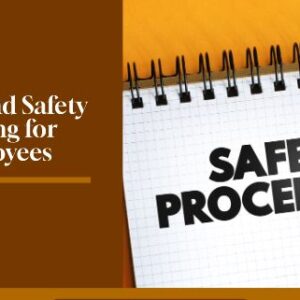The Anti-Bribery Training online course is designed to provide comprehensive training on understanding and preventing bribery in various professional settings. This course aims to equip participants with the knowledge and skills necessary to recognize and handle bribery risks, promote ethical conduct, and ensure compliance with anti-bribery laws and regulations.
What you’ll learn:
Module 1: Introduction to Bribery
– Understanding the concept and impact of bribery
– Overview of different types of bribery (e.g., bribery in business, public sector)
– Recognizing the consequences of bribery for individuals and organizations
Module 2: Legal Framework and Anti-Bribery Laws
– Familiarizing with relevant national and international anti-bribery laws
– Understanding the legal obligations and consequences related to bribery
– Identifying regulatory bodies and enforcement mechanisms
Module 3: Recognizing Bribery Red Flags
– Identifying common bribery red flags and warning signs
– Understanding the tactics and strategies used in bribery schemes
– Recognizing situations where bribery risks are heightened
Module 4: Anti-Bribery Policies and Procedures
– Developing effective anti-bribery policies and procedures
– Implementing internal controls and safeguards against bribery
– Promoting a culture of integrity and transparency within organizations
Module 5: Due Diligence and Risk Assessment
– Conducting due diligence on business partners, third parties, and suppliers
– Assessing bribery risks and vulnerabilities within organizational processes
– Implementing risk mitigation strategies and controls
Module 6: Reporting and Whistleblowing
– Understanding the importance of reporting suspected bribery incidents
– Recognizing whistleblower protections and mechanisms
– Establishing reporting channels and ensuring confidentiality
Module 7: Training and Awareness Programs
– Designing and delivering effective anti-bribery training programs
– Promoting awareness of bribery risks and ethical conduct
– Engaging employees and stakeholders in anti-bribery initiatives
Module 8: Investigation and Response
– Conducting internal investigations into suspected bribery incidents
– Coordinating with law enforcement and regulatory bodies, if necessary
– Implementing appropriate disciplinary actions and remedial measures
Module 9: Compliance and Continuous Improvement
– Ensuring ongoing compliance with anti-bribery laws and regulations
– Monitoring and evaluating the effectiveness of anti-bribery programs
– Promoting continuous improvement and adapting to evolving bribery risks
Career Path:
Completing the Anti-Bribery Training course can lead to various career opportunities where expertise in anti-bribery and compliance is valued. Here are some potential career paths:
1. Compliance Officer: Work as a compliance officer within organizations, ensuring compliance with anti-bribery laws, regulations, and internal policies. Conduct risk assessments, develop and implement anti-bribery programs, and provide guidance on ethical conduct.
2. Risk Management Consultant: Provide consultancy services to organizations on risk management, specifically focusing on anti-bribery. Conduct risk assessments, develop risk mitigation strategies, and assist in implementing effective anti-bribery controls.
3. Internal Auditor: Specialize in auditing and evaluating anti-bribery programs and controls within organizations. Identify areas of non-compliance, recommend improvements, and ensure adherence to anti-bribery policies and procedures.
4. Legal Counsel: Specialize in anti-bribery and compliance within the legal field. Provide legal advice on anti-bribery laws and regulations, conduct investigations, and assist in developing anti-bribery policies and programs.
5. Anti-Corruption Specialist: Work in government agencies, NGOs, or international organizations focused on anti-corruption efforts. Contribute to anti-bribery initiatives, provide guidance on compliance, and engage in policy development and advocacy.
6. Risk and Compliance Manager: Oversee risk and compliance functions within organizations, including anti-bribery measures. Develop and implement compliance programs, monitor adherence to anti-bribery policies, and provide training and guidance to employees.

 Food Allergen Awareness Training
Food Allergen Awareness Training  Advance Driver Awareness
Advance Driver Awareness  Work At Height Training
Work At Height Training  Online Fire Safety Course
Online Fire Safety Course  Recording and Reporting in Social Care
Recording and Reporting in Social Care  Health and Safety Training For Employees
Health and Safety Training For Employees  Workplace First Aid Training
Workplace First Aid Training  ILM Assured Leadership and Management Training Package
ILM Assured Leadership and Management Training Package  Process Safety Management
Process Safety Management  Time Management Training Course
Time Management Training Course